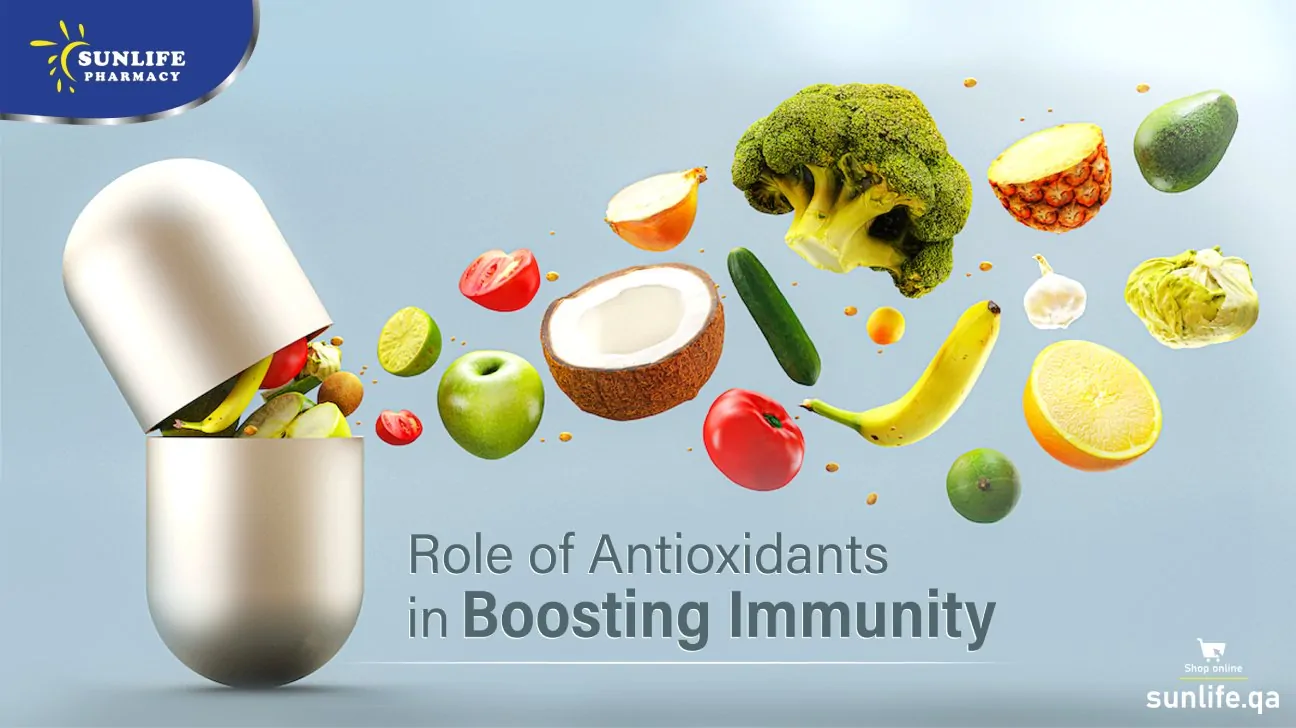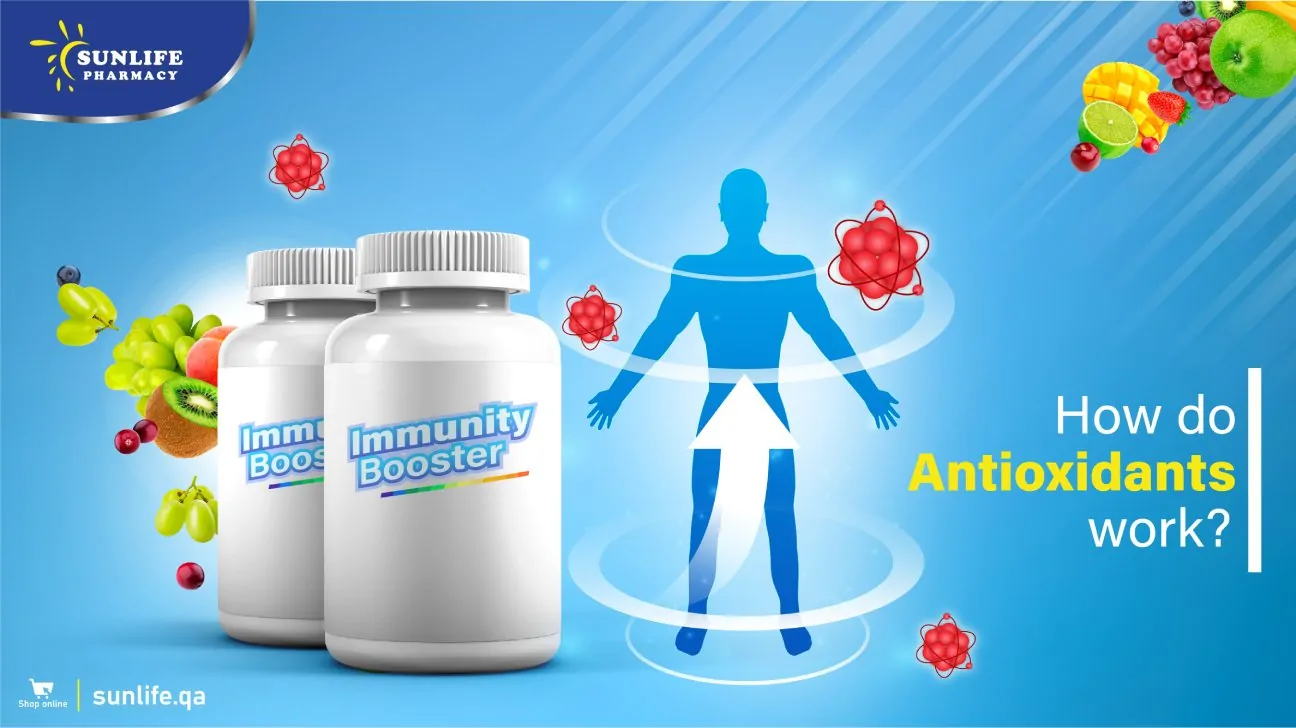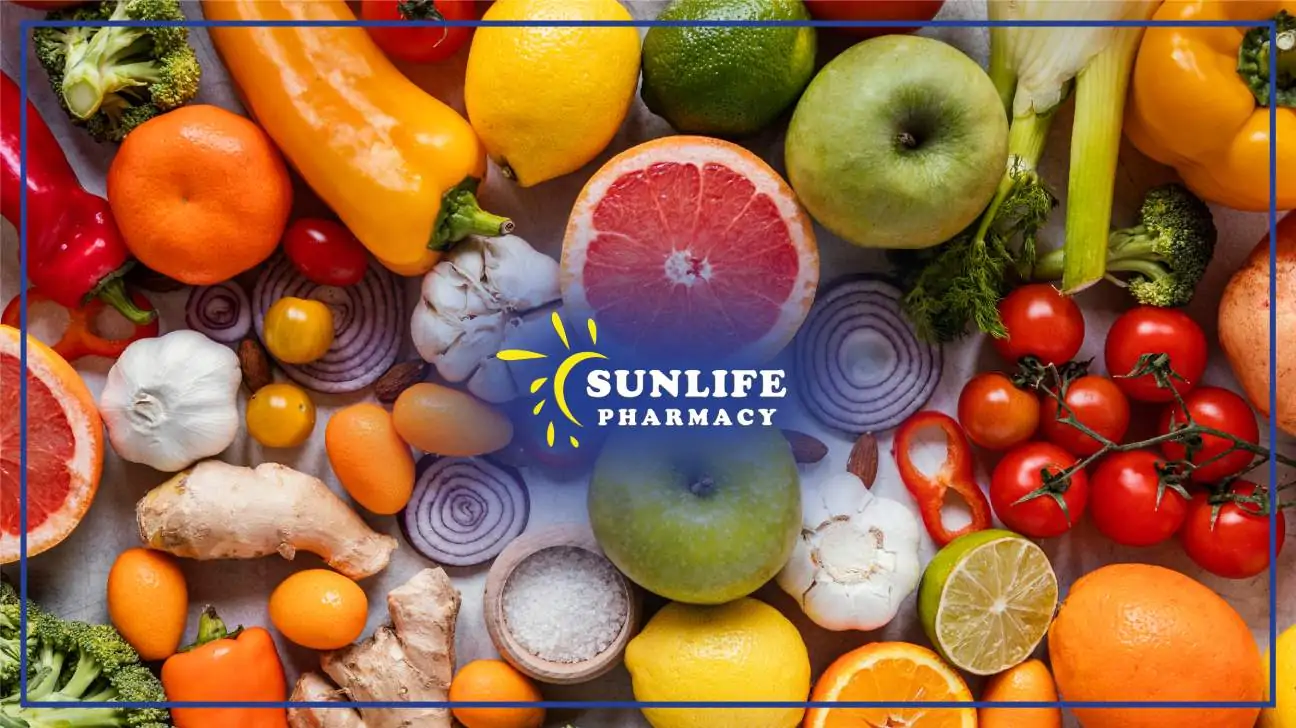Antioxidants and Immunity

Best Online Pharmacy Qatar – Sunlife Pharmacies
Best online pharmacy Qatar – Sunlife Pharmacy has published several immunity related or immunity based blogs and emphasized on the importance of Antioxidants and its effectiveness in boosting the immunity.
What is an Antioxidant? What does it do with Free Radicals and by the way you must be wondering what are free radicals. Don’t worry, you will get all your answers in this blog.
‘Antioxidant’ is a curious word that often makes an appearance in health and wellness discussions. And it’s not surprising – these potent compounds are poised to defend your body from those reprehensible, DNA-attacking villains: free radicals. It’s an epic tale of good versus bad. Antioxidants have certainly had their moment of late, with many experts purporting they offer a slew of benefits for skin, cognition, eyes, mood and the heart. But do they really have the capacity to support immune defenses, as so many of the claims suggest? And if so, what antioxidants are the true immune-supporting champs? Let’s find out.
Sunlife Pharmacy provides Immunity Supplement- Best Online Pharmacy Qatar
Before we start telling you the process, Sunlife Pharmacy which is the Best Online Pharmacy in Doha urges you to visit its immunity supplement online storeto explore the best supplements for your requirements.
There is a term called as Freedaicals. Free radicals are molecular in nature and they have an independent existence that contains an unpaired electron in an atomic orbital. They exist in free nature and need an external source to move inside the human through a certain external sources such as exposure to X-rays, ozone, cigarette smoking, air pollutants, and industrial chemicals etc.
Free radicals are unstable molecules which create disturbances in the body if not controlled on time. It has the potential to damaze cell membranes , enzymes and can change the sequence of DNA in the human body.Such disturbance which occurred due to the excess of external free radicals in the body is known as the oxidative stress.
Whenever these free radicals enter the human body, the immune system becomes active.
It starts releasing the antibodies to counterfeit the foreign invaders. If the immunity is strong then this fight lasts long and finally the immune system wins over the free radicals. In either case, the body will be exhausted and the immune system will become too weak which causes Oxidative stress.
We hope now you understand the meaning of oxidative stress very well.

Antioxidants make the immune system strong. These antioxidants are present in the human body naturally and if it becomes low then it can be compensated by including certain supplements in the diet or shall take a vitamin and minerals rich diet.
Generally, free radicals weaken the antioxidants which our body produces naturally. However, you can compensate for the deficiency by maintaining a healthy lifestyle, have a vitamin and minerals based rich diet, include supplements in your daily diet if required and stay happy. Sunlife Pharmacies is the best online pharmacy Qatar offers a variety of rage of antioxidants rich immunity supplements.
Do all antioxidants have certain characteristics?
As mentioned earlier, antioxidants are naturally formed in the body and it is also available in the form of certain supplements which block the oxidation process and prevent cell damage.
Nature has blessed us with everything. It is no surprise that antioxidants are available in most fruits, grains, vegetables and nuts in different quantities per mg. There are certain form and the examples are mentioned below:
- Beta-carotene
- Selenium
- Vitamin A, C, E
Natural available substance resources such as vegetables, fruits, nuts etc. are rich sources of antioxidants.
There is always a specific amount associated with the daily supplement intake. Excessive supplements of antioxidants may be linked to health risks in some cases. For example, high doses of beta-carotene may increase the risk of lung cancer in smokers. Similarly, having the high intake of supplements such as Vit. E, C may provide adverse effects to your body.
Sunlife Pharmacies is the best online pharmacy Qatar and it has a lot to offer in immunity supplements category for all age groups.
What antioxidants are especially good for immune function?
Vitamin C: A king of Antioxidant
It is also known as ascorbic acid – is one of the biggest players in the antioxidant world. This powerhouse has an positive effect on virtually every aspect of your immune system: it supports ‘natural killer cells’ (NK) that eliminate infectious and malignant targets; ‘neutrophils’ that fight bacterial infections; ‘antibodies’ that identify and destroy invading threats; and ‘lymphocytes’ that produce antibodies iv. It fights free radicals, too, acting as a barrier against invading infections, viruses and diseases. Indeed, there’s no dearth of controlled trials demonstrating vitamin C’s capacity to reduce the severity and duration of respiratory tract infections, especially the common cold v. Since your body can’t produce vitamin C, a plentiful supply must come from your diet. Load up on citrus fruits, peppers, strawberries, broccoli, and tomatoes. Top tip: iron helps with the absorption of vitamin C, so why not partner your intake with quinoa, spinach or beans?
Vitamin E: A Must for Immunity
Vitamin E is also a superstar for immunity. Not only is it the first line of defense against oxidative damage, but it’s needed for the normal function of cells in the immune system, too vi. Alongside its antioxidant credentials, vitamin E helps to reinforce the body’s resistance to bacterial and viral infections, enhance antibody concentration, and increase the production of natural killer cells (NK) in the immune system vii. A vitamin E deficiency will likely reduce the function of key immunity defenders: the B and T cells. And decreased T cell function can contribute to ‘immunosenescence’, whereby immune function decreases with age viii. You can up your intake of vitamin E by munching on sunflowers seeds, almonds, hazelnuts, pine nuts, avocado, salmon and mangos.

Beta-carotene: A Source of Color to the Vegetables
Beta-carotene is another powerhouse for immune function which is popular as a plant pigment that gives red, orange, and yellow vegetables their vibrant color. Beta carotene is considered a provitamin A carotenoid, meaning that the body can convert it into vitamin A (retinol). Additionally, beta carotene has powerful antioxidant properties.. In addition to being a precursor for the immune protector, vitamin A, this nutrient provides powerful antioxidant defenses against invading pathogens.
We can’t discuss beta-carotene without mentioning vitamin A. Your body converts beta-carotene into vitamin A, which plays a pivotal role in protecting your body against infection. A deficiency may compromise a number of immune functions, such as the production of natural killer cells, T cells, and B cells xi. Did you know beta-carotene is responsible for the yellow, red and orange hues of certain fruits and veggies? Carrots, sweet potatoes, squash, red and yellow peppers, apricots and cantaloupe are all brimming in the stuff.
Flavonoids: A rich antioxidant
Flavonoids have beneficial anti-inflammatory effects and they protect your cells from oxidative damage that can lead to disease. These dietary antioxidants can prevent the development of cardiovascular disease, diabetes, cancer, and cognitive diseases like Alzheimer’s and dementia.
Thanks to their impressive antioxidant properties, flavonoids – powerful plant pigments – provide protection from free radical damage, as well as supporting the cells that regulate your immune responses, cytokines xii. A study published in Advances In Nutritiondemonstrated that flavonoids played an essential role in the immune system’s defences against respiratory tract infectionsxiii. The report established those who ate foods rich in these plant pigments were less likely to contract an upper respiratory tract infection than those who didn’t. The good news is flavonoids can be found in plenty of food groups. To ready yourself for whatever Mother Nature’s throws your way, embrace berries (strawberries, blackberries, raspberries), tree fruits (bananas, apples, pears), nuts (walnuts, pecans) and beans (soybean, fava beans), veggies (tomatoes, aubergine, onions, celery, artichokes), spices (dill, thyme), and beverages (red wine, tea).
Selenium: A Potent Antioxidant
Selenium excels at supporting your immune system, too. This potent antioxidant keeps your immunity. It is also helpful in keeping your heart stronger. A diet rich in selenium prevents your body from chronic heart diseases. Since it is one of the strong antioxidants, hence it helps in reducing the oxidative stress. As a result it reduces the chances of cancer. Research has suggested that The number of people with Alzheimer’s disease is growing. Thus, finding ways to prevent this degenerative disease is imperative. With low oxidative stress the symptoms can be controlled. The recommended intake od selenin in daily diet will help to reduce the thyroid related and Asthma problem. The best sources of Selenium are Chicken Breast, Sardines, Sunflower Seeds, Oysters, Yellowfin Tuna etc.
Zinc: A Master Antioxidant
Last but certainly not least, we have to sing the praises of the antioxidant zinc – a powerful weapon for immunity.
Zinc is an important mineral in making the immune system stronger. It has the ability to heal the wound and make the metabolism system stronger.

The best source of Zinc is chicken, red meat and fortified breakfast cereals.
Did you know a small deficiency of this nutrient can eaken the immune system, leading to poor immune cell responses, and a reduction in T cells, natural killer cells, and antibodies. Our body does not have the ability to store the zinc for long, so you need to eat enough of it every day to keep your mineral reserves stocked up.
Final thoughts
To support your immune system all year round, aim to fill up on five to seven antioxidant-rich fruits and veggies every day.
Credit Source: https://www.naturesbest.co.uk/our-blog/can-antioxidants-really-improve-immune-health/
References:
- Advances in Nutrition: https://academic.oup.com/advances
- Webmed: https://www.webmd.com/diet/foods-high-in-flavonoids#1
- Healthline: https://www.healthline.com/health/beta-carotene-benefits#:~:text=Beta%20carotene%20is%20a%20plant,carotene%20has%20powerful%20antioxidant%20properties


